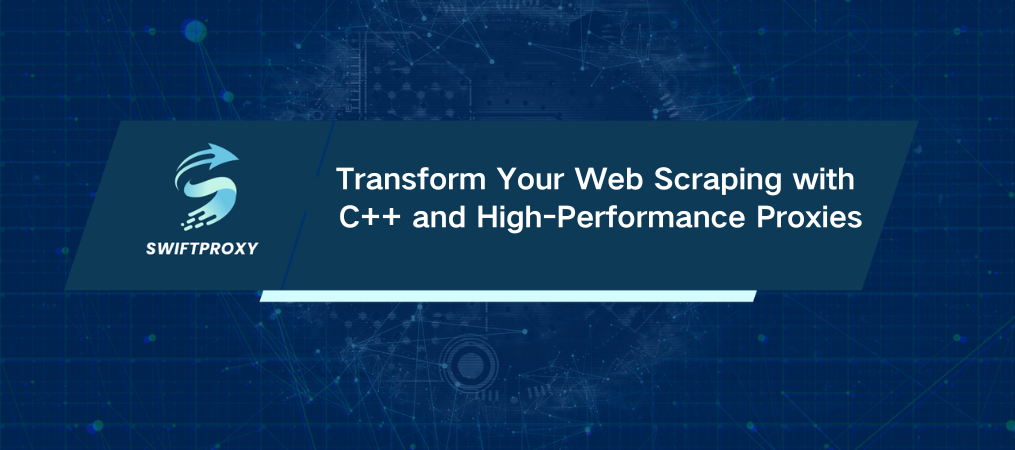Transform Your Web Scraping with C++ and High-Performance Proxies

Web scraping is no longer just a useful tool—it's a business imperative. As data volumes soar and websites become more complex, traditional scraping methods can't keep up. If you're finding that your Python scripts are taking hours to process massive datasets, it's time to upgrade. Enter C++.
The Speed You Need to Stay Ahead
Speed is everything. Whether you're tracking market trends, monitoring competitor prices, or fine-tuning SEO strategies, data collection needs to happen fast. Slow scraping can slow your entire operation down, costing you both time and money. Traditional approaches often fall short, especially when it comes to scaling. But with C++, you can cut processing times dramatically, handle larger datasets, and stay ahead of the competition. It's not just about scraping faster—it's about transforming your ability to make data-driven decisions on the fly.
Why C++ Is the Secret Weapon for Web Scraping
C++ is synonymous with speed. It's built to handle resource-intensive tasks, and web scraping is no exception. The advanced libraries available in C++ can supercharge your scraping backend, reducing latency, improving scalability, and allowing you to collect insights faster. It's more than just performance—C++ allows you to make data collection a strategic advantage.
Top C++ Libraries That Will Revolutionize Your Web Scraping
Not all C++ libraries are created equal, but these stand out as the best tools to turbocharge your scraping operations:
· Curl for C++: This library handles HTTP requests with ease, managing cookies, authentication, and responses. It's a cornerstone of any web scraper.
· Boost::Beast: Part of the renowned Boost library, Beast gives you fine-grained control over both HTTP and WebSocket operations. Whether you're scraping static sites or interactive pages, Beast is up to the task.
· Gumbo: Parsing complex HTML is no challenge for Gumbo. This library extracts structured data with speed, making it an essential asset for large-scale projects.
· RapidJSON: Need to work with JSON data? RapidJSON is built for blazing-fast parsing, ideal for working with APIs or scraping data in JSON format.
· OpenCV: Not just for computer vision! OpenCV can be invaluable for scraping projects that require image processing or optical character recognition (OCR). Need to extract text from images? OpenCV has you covered.
How to Integrate C++ Libraries Into Your Scraping Workflow
Transitioning to C++ may sound intimidating, but it's not as complex as it seems. Here's how to get started:
· Identify the Bottlenecks: Is HTML parsing your bottleneck? Or is network latency slowing you down? Pinpointing where your system is struggling helps you decide which C++ libraries will have the biggest impact.
· Start Small, Scale Gradually: Replace key components of your workflow with C++ equivalents. For example, start by handling network requests or parsing HTML in C++, then gradually migrate other tasks.
· Integrate with Your Existing Codebase: Use inter-process communication or language bindings to connect your Python (or other language) code with C++ components. This lets you improve performance without a full rewrite.
· Embrace Multi-threading: Many C++ libraries support multi-core processors. Leverage parallel processing to get even more speed from your system.
Challenges to Watch Out For
Of course, there are challenges. C++ requires manual memory management, unlike Python, which can handle this automatically. But don't worry—modern C++ practices and smart pointers can help avoid memory leaks. Additionally, if your team isn't familiar with C++, there's a learning curve. But with training and careful planning, the transition can be smooth, and the benefits far outweigh the initial investment.
Expanding Your Scraping Infrastructure
As your scraping needs grow, so does your infrastructure. That's where a scalable proxy network comes in. At Swiftproxy, we offer powerful proxy solutions designed to integrate seamlessly with C++-powered scraping backends. Whether you need residential, datacenter, or mobile proxies, we've got you covered. When paired with your high-performance C++ scraper, you'll have the reliability and flexibility needed to scale efficiently.
How C++ Will Shape the Future of Web Scraping
As web technologies continue to evolve, C++ will be there, adapting to meet new challenges. With emerging features like coroutines and improved concurrency models, the future of web scraping will demand even more performance. By adopting C++ today, you position your business for long-term success. Moreover, C++'s potential goes beyond scraping. With seamless integration into machine learning and big data processing frameworks, C++ can help you analyze data in real-time, pushing your scraping system to the cutting edge.
Conclusion
Upgrading your web scraping system with C++ isn't just a performance tweak—it's a game-changer. You'll process data faster, handle larger volumes, and make quicker, more informed decisions. And the best part? Once you've made the switch, the scalability and speed gains are immense.
The initial learning curve and integration efforts may require some investment. But in the long run, the payoff is clear: faster scraping, smoother workflows, and a massive competitive advantage.
At Swiftproxy, we're here to support you every step of the way. Whether you're starting with C++ or looking to scale your existing setup, we provide advanced proxy solutions that work in harmony with high-performance scraping backends.

















































